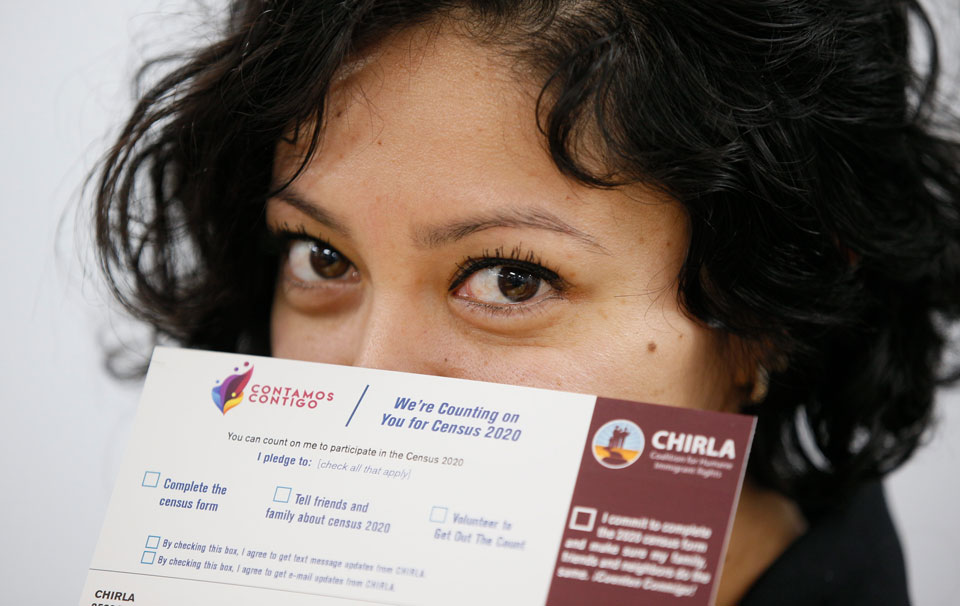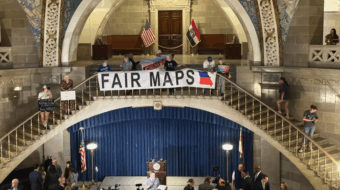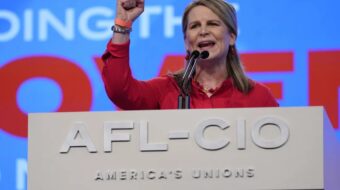
WASHINGTON—Workers, including African-Americans, Latinos, and other minorities, lost one of the biggest U.S. Supreme Court decisions in years, as the justices, on a party-line 5-4 vote, allowed political gerrymandering to continue. The majority called gerrymandering “a political question” only the states can solve.
But those same groups got a split decision on the other key case the justices decided: Whether the Trump administration could add a “citizenship” question on next year’s census—one that could scare immigrants away from filling out the forms on concerns that their information could be used against them or loved ones. That vote was the same 5-4 split.
All five Republican-named justices, led by Chief Justice John Roberts, who wrote both rulings, sided with GOP gerrymanderers in North Carolina and Democratic congressional gerrymanders in Maryland. All four Democratic-named justices dissented in both cases.
But those same five said Commerce Secretary Wilbur Ross created a “pretextual reason”—legal language for making something up—to justify the census citizenship question. Ross has constitutional authority to decide the terms of the census, the justices said. But he botched it, and they sent the whole mess back down to the Commerce Department and lower courts to reconsider. That cheered advocates for immigrants, the most likely to be undercounted due to the citizenship question, whether documented or not.
The justices did not cite newly discovered evidence of GOP collusion to insert the citizenship question into the census. In that evidence, a party redistricting expert told Trump officials how the question was designed to count and benefit non-Hispanic whites, and Republicans and not count, and thus hurt, everyone else. Civil rights groups want lower courts to reopen the census case to include it.
The gerrymandering case is important because GOP-gerrymandered state legislatures in the swing states of Ohio, Michigan, North Carolina, Wisconsin, Iowa, Pennsylvania, and Florida, plus various “red” Republican-run states, have enacted rafts of anti-worker legislation. Keeping those legislatures gerrymandered will let them try to continue that trend for a decade or more.
The anti-worker measures from gerrymandered legislatures include so-called right-to-work laws, Wisconsin’s draconian Act 10—which stripped state public worker unions of dues, collective bargaining rights, and other protections—and Michigan’s curbs on teacher tenure and its takeover “czar” legislation.
The “czar,” pushed through the GOP-run, GOP-gerrymandered legislature and signed by former GOP Gov. Rick Snyder, lets the state seize control of allegedly financially failing governments and install an all-powerful administrator over the heads of local elected officials.
The czar can do everything from dumping union contracts and firing all the teachers (Detroit’s school district) to switching the city’s water source to save money while poisoning kids (Flint). Czars have been imposed only on majority-minority governments.
Letting gerrymandering stand, except in cases of baldly racially based gerrymandering, would also perpetuate inequities and party tilts. It would do so by making millions of people, especially workers, women, and minorities, second-class citizens in voting for a decade or more. Gerrymandering lets lawmakers select their constituents, so to speak, not the other way around.
That’s because a heavily gerrymandered legislature in 2021, after it gets new census data, could then draw new and newly gerrymandered districts good for the next decade. And that’s also where the citizenship census question comes in.
The citizenship question case is important because, President Trump’s Commerce Secretary, Wilbur Ross, concocted his ruling out of thin air to insert the question, as even Roberts conceded. Census Bureau experts said adding the question would produce an undercount of people of color, especially Latinos. Non-citizens would fear filling out the forms in order to protect themselves, while citizens could fear to complete it lest they expose undocumented loved ones to immigration officials.
As a result, the undercount would cost those communities legislative and congressional seats and dollars from federal aid programs. Those seats and dollars would instead go to white, Republican-run states.
Chief Justice Roberts quoted Ross as saying “the need for accurate citizenship data and the limited burden reinstatement of the citizenship question would impose outweigh fears of a potentially lower response rate.” Census Bureau experts, cited by the challengers, said there would be a 5.8% overall undercount as a result of a citizenship question.
Roberts also warned past High Court rulings show “a court may not set aside an agency’s policymaking decision”—in this case, Ross’s ruling for the citizenship question—“solely because it might have been influenced by political considerations or an administration’s priorities.”
But courts can dump agency rulings in some cases, and Roberts found one. He said Ross offered a “pretext” for inserting the citizenship question on the census form—a question Ross was determined to add since his first days in office in 2017. That was enough, the court majority ruled, to send the whole case back to the agency and lower courts. Doing so may raise a practical problem, as even Roberts noted the Census Bureau faced an end-of-June deadline to print all the census forms.

The lower courts, in cases brought by cities, states, and civil rights groups, found Ross’s ruling for the citizenship question was “arbitrary and capricious” and that it violated the law. But those judges also ruled the census citizenship question’s challengers “had not met their burden of showing the secretary was motivated by discriminatory animus”—in plain English, that Ross wanted to discriminate against communities of color.
Nevertheless, the High Court’s ruling to remand the case back down cheered Janet Murguía, president of UnidosUS, formerly the National Council of La Raza Unida, one of the nation’s most prominent advocacy groups for Latinos. She called the citizenship question “untested and unnecessary.”
“UnidosUS commends the Supreme Court’s ruling to uphold the Census’s constitutional mandate to count every person living in the United States. This decision places pressure on the U.S. Census Bureau to provide additional rationale for one of the most dishonest and racially motivated attempts yet by the Trump administration to deprive communities of color, and specifically Latinos, of our rightful place in this country’s political process,” she said.
“We remain vigilant as we know that there is still much more work ahead to ensure a true count of all communities. We and our affiliate network of community-based organizations throughout the country are ready to redouble our efforts in marginalized and hard-to-count communities. We want every single person living in America—no matter their race, immigration or citizenship status—to be counted in this important process that determines many critical community services such as schools, hospitals, roads, and congressional representation.”










